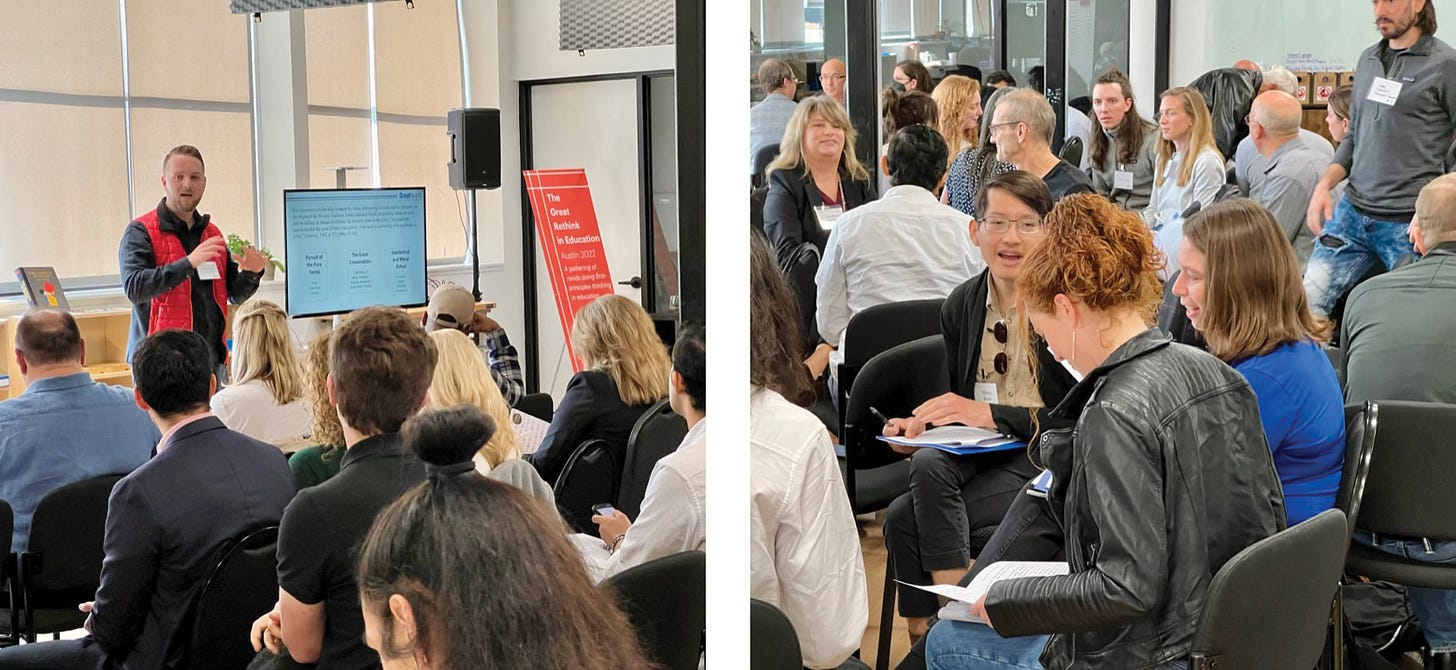The Great Rethink in Education, Austin
Montessorium’s mission, at the object level, is to articulate a true philosophy of education. Accordingly, our primary meta-level thesis is that the philosophy of education matters.
The Great Rethink in Education is a series of small conferences aimed at filling a poorly served niche: pushing for an intellectual sharpening of education discourse. They are the joint brainchild of Joe Connor at Odyssey and us at Montessorium, the think tank arm of Higher Ground Education.
It’s a thrilling time for education, due to a convergence of widespread dissatisfaction with the status quo, a real wave of change in policy and political sentiment, the rapid maturation of internet technologies, and a century or so of discourse in pedagogy. It’s high time to use this opportunity to think, and especially to rethink, to question long-held assumptions and explore new answers from first principles.
Our first two (1, 2), both in New York, featured Dan Willingham, Leonore Skenazy, Ryan Delk, Kmele Foster, Michael Abello, and many more, with an equally sharp list of attendees. We just wrapped up the third, this time in Austin.
Highlights included:
Kurtis Indorf presented the arc of Great Hearts Academies, a classical charter network also working on online offerings. Kurtis then led us in a discussion of C. S. Lewis (“Men Without Chests”) and L. M. Sacasas (“Narrative Collapse”).
Keith Schacht of The Explanation Company presented an argument for why kids don’t get enough screen time, and how it can be leveraged for independent learning.
Julia Richards and Laura Mazer presented and discussed the pedagogical model at The Academy of Thought and Industry Austin, the Montessori middle and high school at which the Great Rethink was hosted.
Joe Connor (Odyssey) and Stacy Hock (Texas Public Policy Foundation, among many others) discussed the state of the art of education policy, nationally and in Texas in particular, including the ins and outs of specific regulatory changes, the players these changes have made space for, and the dramatic post-covid shifts in political sentiment about education.
Michael Strong of The Socratic Experience spoke about the necessity of virtue culture in schools. He described several models for virtue communities, and noted the indispensable role that communities play in schools that are serious about deep outcomes, as well as virtue-infused practices like Socratic.
Malcolm Collins presented the most radical ideas of The Collins Institute: meta-level assessment of curriculum using prediction markets, empowering high-agency students, and skepticism about values in education.
Natalie Clark spoke about her desiderata for her next education project, and the lessons she learned at the Texas Education Agency and Alpha School on her quest for pedagogical innovation.
David Kokorowski of Pearson spoke about how they navigate cultural controversies from a position of principle in their textbook business, and how it plays out in practice in particular political firestorms.
Deb Ross of Kids Out and About discussed some data on parents as customers: what parents who enroll in private schools explicitly prioritize, including some surprising results (individual care beat standards, character beat academics).
Greg Salmieri, a philosopher at UT Austin’s Salem Center, wrapped up by “bringing not peace but the sword”, highlighting some of the disagreements surfaced at the conference on epistemology and ethics, and arguing for the necessity of freedom in education, the freedom to figure education out and to persuade one another (or not) in the face of disagreement.
We’re planning on hosting in the late winter, likely in Miami this time. Email info@montessorium.com if you’re interested in attending.



Thanks for the summary, Matt. Were any of the sessions recorded? I’m particularly interested in Deb Ross’s presentation/data.